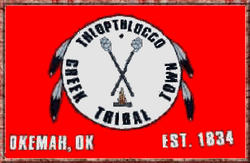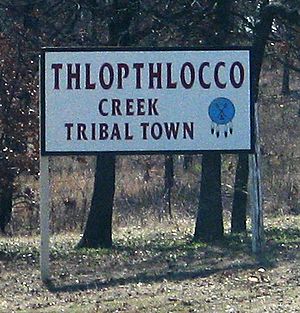Thlopthlocco Tribal Town facts for kids
 |
|
| Total population | |
|---|---|
| 845 (2011) | |
| Regions with significant populations | |
| Oklahoma, United States | |
| Languages | |
| English, Mvskoke | |
| Religion | |
| Protestantism, traditional tribal religion | |
| Related ethnic groups | |
| Other Muskogean peoples, including Alabama, Coushatta, Miccosukee, Chickasaw, Choctaw, Muscogee Creek, and Seminole |
The Thlopthlocco Tribal Town is a special Native American tribe. It is officially recognized by the United States government. This tribe is also a traditional town of the Muscogee Creek Indians. They are located in the state of Oklahoma. The people of Thlopthlocco Tribal Town speak Mvskoke. This language is also known as Creek.
Contents
The Muscogee Creek Language
The Thlopthlocco Tribal Town speaks the Mvskoke language. This language is also called Creek. In the Muscogee Creek alphabet, the "thl" sound is often written with an "r". It makes a unique sound that is hard to describe. Imagine placing your tongue between the "th" and "l" sounds.
History of the Thlopthlocco Tribal Town
The Muscogee Creek people once lived in the southeastern United States. This area is now Alabama and Georgia. Their group was made up of many independent tribal towns. Each town had its own elected leaders.
In the 1830s, the United States government moved many Native American tribes. This was part of a plan called the Indian Removal Policy. The Muscogee Creek people were forced to move from their homes. They traveled to an area called Indian Territory. This territory is now the state of Oklahoma.
Before 1832, the Thlopthlocco Tribal Town separated from a larger town. Its members were moved to Indian Territory in 1835. They settled in an area south of Okemah, Oklahoma. This land is now part of Okfuskee County. The Osage and Quapaw tribes had lived there before.
The Civil War and New Beginnings
During the American Civil War, the Thlopthlocco Tribal Town was important. It was a temporary base for a Confederate leader. Another Muscogee leader, Opothleyahola, tried to help his people. He worked to solve problems between different Creek groups during the war. To avoid the fighting, he and about 5,000 others moved north to Kansas.
After the war, the Muscogee Creek people signed a treaty in 1866. This agreement was with the United States. It said that formerly enslaved people would be free. It also said that these Creek Freedmen could become members of the Muscogee Nation. These freedmen started new towns in Okfuskee County. Some of these towns include Boley and Clearview.
Keeping Their Identity
Later, the United States government changed how land was owned. This was through the Dawes Act of 1896. Land was given to individual families instead of the whole tribe. Even with these changes, the Thlopthlocco Tribal Town kept its unique identity.
From 1898 to 1906, tribal members were officially registered. These lists are known as the Dawes Rolls. After land was given to families, the government sold other tribal lands. These lands were sold to new settlers. This made it harder for tribes to keep their shared territories.
The Thlopthlocco Tribal Town officially organized as a distinct tribe in 1936. This happened under the Oklahoma Indian Welfare Act. This act followed a national law called the Indian Reorganization Act of 1934. The tribe's first main office was at the Thlopthlocco Methodist Episcopal Church. This church was located between Wetumka and Okemah.
In 2012, the National Indian Gaming Commission sent a notice to the tribe. It was about their casinos. The notice said they needed to follow certain rules for managing their casinos. In 2014, the tribe received a large grant. The U.S. Department of Agriculture gave them $500,000. This money helped them work with Euchee Butterfly Farm. They used it to grow more butterflies.
Economic Development
The Thlopthlocco Tribal Town works to help its community grow. They have their own housing program for tribal members. They also run a smoke shop. The tribe operates the Golden Pony Casino in Okemah. In 2011, the tribe's businesses brought in $12.5 million. This shows their strong economic impact.
Two companies from Atlanta, Georgia, help manage casinos in the town. These companies are Titan Network LLC and Mercury Gaming Group LLC. They help operate places like the Golden Pony Casino.
 | Bessie Coleman |
 | Spann Watson |
 | Jill E. Brown |
 | Sherman W. White |


